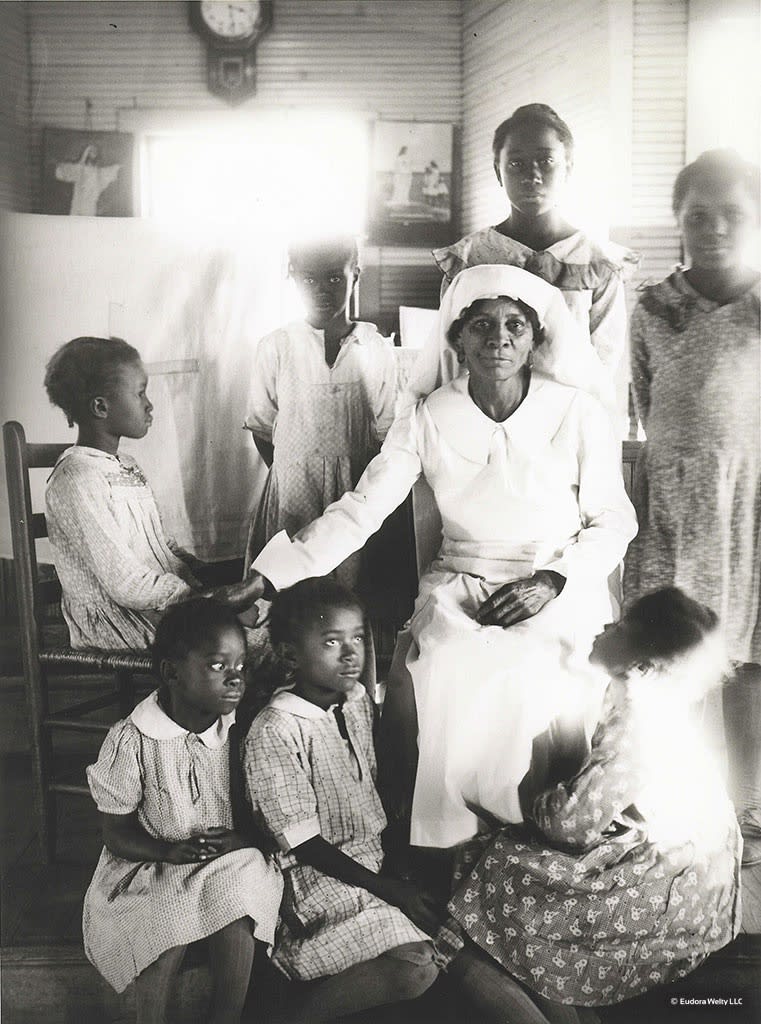
I confess only one regret as a Mississippian: that I never met Ms. Eudora Welty, the great writer and photographer whose words and images have offered me consistent, generous inspiration. As I was reminded during a recent visit to her home at 1119 Pinehurst Street, Jackson, a failure of courage deprived me of a chance to have the privilege of knowing her. I have since tried mightily to rectify this misjudgment by immersing myself in her photography, learning about the person posthumously through her lens.
Engrossed in my Southern Literature studies at Ole Miss back in 1997, my mind was full of Ms. Welty’s words and images as I drove to Jackson for a wedding garden party. With the bravado of youth, I parked in front of Ms. Welty’s home at 1119 Pinehurst Street and telephoned my then-beau for a last-minute pep talk. Instead, he chided me for the southern sin of dropping by unannounced. The sound of rapid-fire pecking on a typewriter echoed through her open window as I drove away. I still hear that dirge nearly two decades later.
Since then, I have been honored to appraise, consult, and broker various portfolios and loose prints of Welty’s photographs through Rebekah Jacob Gallery. My deep desire to address her work with the appropriate respect led to copious (perhaps obsessive) research as my team and I have chased down every possible scrap of information. We have diligently sifted through thousands of images and supporting texts and re-read every essay/book she ever wrote. The more I slipped into her photographic world, the more I started to see how the eloquence of her written narratives was also present in visual form in her photographs.
The upper crust of Delta life that we both grew up in was such a dramatic juxtaposition to the images she shot alone on assignment for the WPA in the 1930s, way down back dirt roads. Suffering and proud, everyday Mississippians were imbued with the politics and economics of this complicated land when seen through her compassionate lens. From the images—supported by many discussions with Welty scholar Suzanne Mars—it is clear the gentle, cautious hand she took when approaching her fellow Mississippians for these photographs. No pose was forced, no intimidation used. Instead, Ms. Welty led with respect and the result was poignant portraits of strength and dignity. Then she tightly trimmed her kitchen-sink prints using the same critical eye with which she edited her stories.
This intense study has only fueled my quest to get to the source of her work and to share it with others who share my respect for her oeuvre. The negatives from 1930-1950 are lovingly preserved at the Mississippi Department of Archives and History with rare portfolios (sometimes just a loose print, others as a full unit) elusively showing up in galleries and auctions. As scholarship builds, as more new photographs are revealed, interest in Welty’s photography continues to rise. Given the current market, I think that Welty’s body of work on WPA-era Mississippi is one of the most compelling photographic studies of the American landscape available. There is no doubt that Ms. Welty’s work is now considered a must-have for any true Southern photography collection.
I will continue, like so many others, to gravitate towards my North Star of 1119 Pinehurst Street where I firmly believe her legacy lives on. There is little doubt that she will continue to inform and inspire with words and images to tell the story of our mutual homeland with grace and dignity. Transcending her time, Ms. Welty continues to be Mississippi’s most treasured documentarian and ambassador.
In the meantime, I am eager to tackle yet another portfolio box of gems that just arrived at my doorstep, ready for discovery anew.
